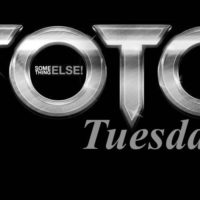The seventh track on Toto’s Through the Looking Glass is the Elton John classic “Burn Down the Mission” from Tumbleweed Connection, released in 1970.
Elton had long been a favorite of Toto members. Steve Lukather played on a series of his albums, beginning with 1979’s Victim of Love. An interesting aside was shared in Lukather’s autobiography, The Gospel According to Luke, concerning his request for time off from Toto: David Paich “did a thoroughly convincing job of looking pissed and barked back, ‘I don’t know, is it cool if you leave us to go and work with my all-time musical hero?'”
In fact, John later asked Lukather to go on tour with him. But he wasn’t the only one who took part in sessions work with Elton. Paich later appeared with Lukather on John’s 21 at 33, also from 1979. Jeff and Steve Porcaro joined Lukather on John’s 1981 album The Fox, and Jeff Porcaro went on to appear on 1982’s Jump Up!
Clearly, they are fans.
Toto’s rendition of “Burn Down the Mission” is very true to the original and, as to be expected, is a great performance by the band. Two highlights are the excellent solo piano from Paich to kick the track off, and the layered dynamic orchestration from Toto in the rousing middle section and ending. “Burn Down the Mission” has natural peaks and valleys, and Toto effortlessly brings a refined approach to realizing these changes. The backing vocals even have that Beatles-esque quality about them.
However, the MVP award on this one goes to singer Bobby Kimball. His performance is powerful and nuanced, and the gospel style is clearly suited to him. Steve Lukather even pays tribute to Kimball in his autobiography, saying “Bobby proves his vocal prowess by nailing Elton John’s ‘Burn Down the Mission.’”
Take a listen. It’s always great to hear an artist at the top of their game and, on this track, we’re treated to some classic Bobby Kimball magic.
- Toto, “Spanish Sea” from ‘Old Is New’ (2018): Toto Tuesdays - June 15, 2021
- Toto, “Devil’s Tower” from ‘Old Is New’ (2018): Toto Tuesdays - May 11, 2021
- Toto, “Alone” from ‘Old Is New’ (2018): Toto Tuesdays - April 27, 2021



